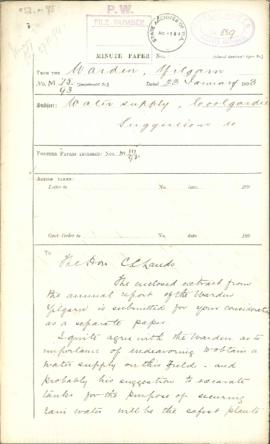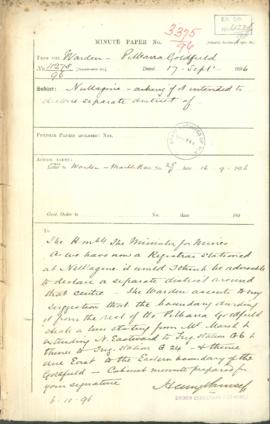Identity area
Reference code
Title
Date(s)
- 1892-01-01 - (Creation)
Level of description
Medium
Format
Status
Context area
Name of creator
Administrative history
The Department of Mines began operations on 1 January 1894. Previously, the regulation of mineral exploration and mining activities in Western Australia had been the responsibility of the Colonial Secretary's Office and the Lands Department. Initially, the Department of Mines was controlled by the Commissioner of Crown Lands; the Department then consisted of a Secretary for Mines, a principal clerk, an assistant clerk, and a draftsman. Towards the end of 1894, the first Minister for Mines (E.H. Wittenoom) took over from the Commissioner as head of the Department. The Secretary for Mines became the Undersecretary for Mines and the Department's administrative and technical staff were increased. Mining districts were established and Mining Registrars and Mining Wardens appointed to the various mineral fields. Mining Registrars were responsible for recording mining claims. Mining Wardens, who were also resident or stipendiary magistrates, presided over the Mining Courts which were established in the major goldfields.
The Department started with five branches: Registration, Accounts Correspondence, Drafting, and Government Geologist (known after 1896 as the Geological Survey Branch). The Department maintained a mining museum in Perth and was responsible for the School of Mines at Kalgoorlie. (The School was established in 1902; in 1969 it became part of the Western Australia Institute of Technology).
Before being replaced by the Department and Minerals and Energy in 1992, the Department consisted of eight divisions: Geological Survey; Mining Engineering; Petroleum; Government Chemical Laboratories; Corporate Services; Explosives and Dangerous Goods; Mining Registration; and Surveys & Mapping. The executive comprised eight division Directors, two Assistant Directors General, and a Director General. The Minister for Minerals and Energy held responsibility for the Department. The Department's mandate was to encourage investment in, and the orderly development of, the State's mineral resources. Historically, the Department's mandate was based on several statutes, most notably the Goldfields Act of 1895 and the Mining Act of 1904.
The Department of Mines became the Department of Minerals and Energy on 1 July 1992. The organisation now operates as the Department of Industry and Resources.



